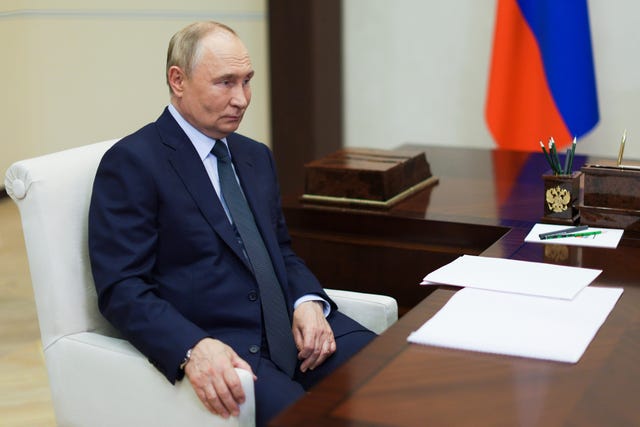German Chancellor Olaf Scholz has urged Russia to be willing to negotiate with Ukraine in his first call with Russian President Vladimir Putin in nearly two years.
The Kremlin responded that Moscow was open to new talks and pointed to Mr Putin’s earlier proposal that Kyiv should cede territory and back off its plans to join Nato.
Government spokesman Steffen Hebestreit said Mr Scholz condemned “Russia’s war of aggression” against Ukraine during the call, and called on Mr Putin to end it by withdrawing troops that launched a full-scale invasion of the country in February 2022.

That conflict reaches its 1,000-day mark next week.
“The chancellor urged Russia to be willing to negotiate with Ukraine with the aim of achieving a just and lasting peace and stressed Germany’s unwavering determination to support Ukraine in its fight against Russian aggression for as long as necessary,” Mr Hebestreit said in a statement.
The new communication between the leader of Germany – one of Ukraine’s strongest backers since late 2022 – and Mr Putin comes at a time of widespread speculation about what the upcoming administration of US President-elect Donald Trump will mean for Ukraine.
Washington has been Ukraine’s biggest military backer, but Mr Trump has repeatedly questioned the amount of aid being given to Ukraine to fight the war.
Mr Trump has also suggested he could settle the war between Russia and Ukraine quickly, though this implies Kyiv should cede territory to Moscow in return for peace.
The German leader condemned Russian air raids on Ukrainian civilian infrastructure and warned that the deployment of North Korean troops to Russia to fight in the war would mark a serious escalation.
The US, South Korea and Ukraine say North Korea has sent thousands of troops to Russia to support its war against Ukraine.
For its part, the Kremlin said Germany initiated the call, during which the two leaders had a “detailed and frank exchange of opinions on the situation in Ukraine”.
Mr Putin blamed “the current crisis” on what he called Nato’s “long-standing aggressive policy aimed at creating an anti-Russian stronghold on Ukrainian territory while ignoring our country’s security interests and trampling on the rights of Russian-speaking residents”, a Kremlin readout said.
Mr Putin also said Russia remains open to resuming peace talks and pointed to conditions he laid out in June, which included Kyiv renouncing its bid to join Nato and withdrawing troops from the four Ukrainian regions that Moscow illegally annexed in 2022.
“Possible agreements should take into account the interests of the Russian Federation in the security sphere, proceed from new territorial realities, and most importantly, eliminate the root causes of the conflict,” the readout said.
Mr Putin also noted the “unprecedented degradation” in bilateral relations between Germany and Russia, the Russian statement said, while noting that the leaders also discussed the situation in the Middle East.
The two sides agreed to remain in contact after the call, which German media reports said lasted about an hour.
German news agency DPA said the two leaders last spoke by phone in December 2022.
Tuesday will mark 1,000 days since the February 24 2022 invasion of Ukraine by Russian troops, even though the armed conflict dates to 2014.
Mr Scholz had spoken beforehand with Ukrainian President Volodymyr Zelensky, and would do so again after the call with Mr Putin, the German statement said.




Why are you making commenting on The National only available to subscribers?
We know there are thousands of National readers who want to debate, argue and go back and forth in the comments section of our stories. We’ve got the most informed readers in Scotland, asking each other the big questions about the future of our country.
Unfortunately, though, these important debates are being spoiled by a vocal minority of trolls who aren’t really interested in the issues, try to derail the conversations, register under fake names, and post vile abuse.
So that’s why we’ve decided to make the ability to comment only available to our paying subscribers. That way, all the trolls who post abuse on our website will have to pay if they want to join the debate – and risk a permanent ban from the account that they subscribe with.
The conversation will go back to what it should be about – people who care passionately about the issues, but disagree constructively on what we should do about them. Let’s get that debate started!
Callum Baird, Editor of The National
Comments: Our rules
We want our comments to be a lively and valuable part of our community - a place where readers can debate and engage with the most important local issues. The ability to comment on our stories is a privilege, not a right, however, and that privilege may be withdrawn if it is abused or misused.
Please report any comments that break our rules.
Read the rules here